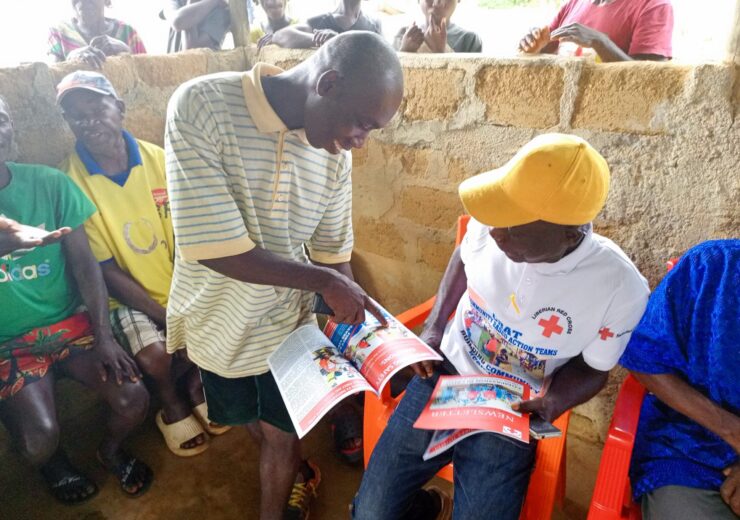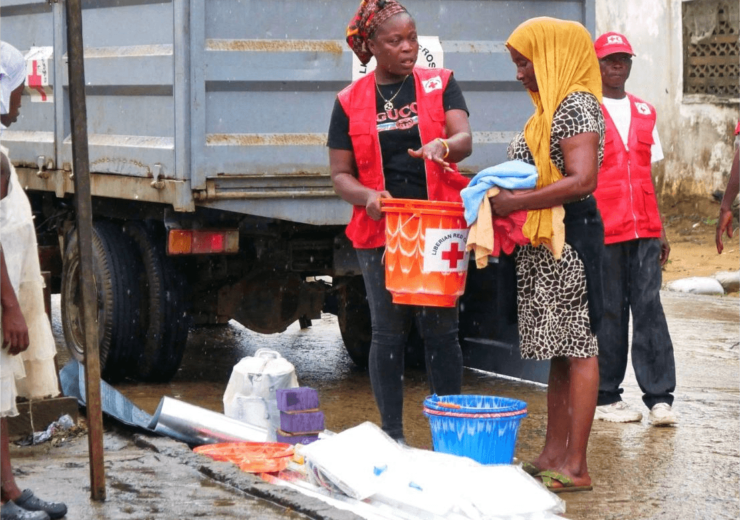CLIMATE & ENVIRONMENT
Liberia faces mounting environmental and climate-related challenges that threaten its people, natural resources, and development progress. From rampant deforestation to coastal erosion, flooding, and pollution, the country’s fragile ecosystems are under constant pressure. Agricultural expansion, logging, and rapid urbanization have significantly contributed to forest loss, thereby weakening Liberia’s carbon sinks and exposing communities to increased environmental hazards. The impacts of climate change—such as rising sea levels, erratic rainfall, and prolonged dry spells—have intensified vulnerabilities in sectors like agriculture, health, and infrastructure, particularly affecting rural and coastal populations.
The Liberia National Red Cross Society (LNRCS) recognizes the urgent need to address these growing threats and has established a robust Climate and Environment Program to enhance community resilience and support national climate goals. The LNRCS is committed to integrating climate change adaptation and environmentally sustainable practices into all its operations. Through the promotion of Nature-based Solutions (NbS), the Society is working to protect ecosystems, restore degraded land, and improve the livelihoods of vulnerable groups. These efforts are grounded in a rights-based and inclusive approach, with particular attention to the unique vulnerabilities faced by women, children, and marginalized populations.
One of the flagship initiatives under this program is the GREEN, INCLUSIVE, AND RESILIENT LIBERIAN COMMUNITIES (GIRL) Project, launched in 2023 with support from the Swedish Red Cross and the Embassy of Sweden. Operating in 45 communities across Sinoe, River Gee, and Grand Kru counties, the GIRL Project focuses on climate change adaptation, community health, and disaster risk reduction. The project mobilizes community-based action teams (CBATs), supports climate-smart agriculture, promotes reforestation and green energy solutions, and builds the capacity of local stakeholders to implement locally-led adaptation strategies.
The LNRCS has further demonstrated leadership in climate action by solarizing its headquarters and eight regional offices across the country, contributing to reduced carbon emissions and energy sustainability. Through awareness campaigns, environmental cleanup drives, and the establishment of Climate and Environment Friendly Clubs in schools, the LNRCS fosters a culture of environmental stewardship from a young age. These clubs serve as hubs for youth-led advocacy, education, and practical action on climate resilience and sustainability.
At the community level, the LNRCS trains farmers in climate-smart agricultural practices, enabling them to adapt to shifting weather patterns while safeguarding food security. Community-Based Action Teams are not only trained in climate resilience but are also engaged in tree planting, environmental monitoring, and dissemination of early warning messages. These localized, participatory approaches help ensure that interventions are relevant, effective, and owned by the communities they serve. Through its work, the LNRCS supports the government’s climate priorities and advances global climate commitments.
The Society also emphasizes the importance of forecast-based financing and anticipatory action, equipping staff and volunteers with the tools and knowledge to respond proactively to climate risks. LNRCS volunteers are key actors in implementing environmentally sustainable practices in their localities, including solid waste management and the promotion of renewable energy solutions. In all its projects, the LNRCS mainstreams green response and environmental safeguards, ensuring that humanitarian interventions do not inadvertently contribute to environmental degradation.
Looking ahead, the LNRCS is developing a comprehensive climate and environmental mainstreaming strategy to guide future programming. By promoting inclusive, community-driven adaptation and resilience-building activities, the organization aims to ensure that vulnerable populations are not just protected from environmental harm but are active participants in shaping sustainable futures. Through innovation, local engagement, and strong partnerships, the LNRCS continues to lead the way in addressing Liberia’s climate and environmental crises with compassion, foresight, and resolve.



